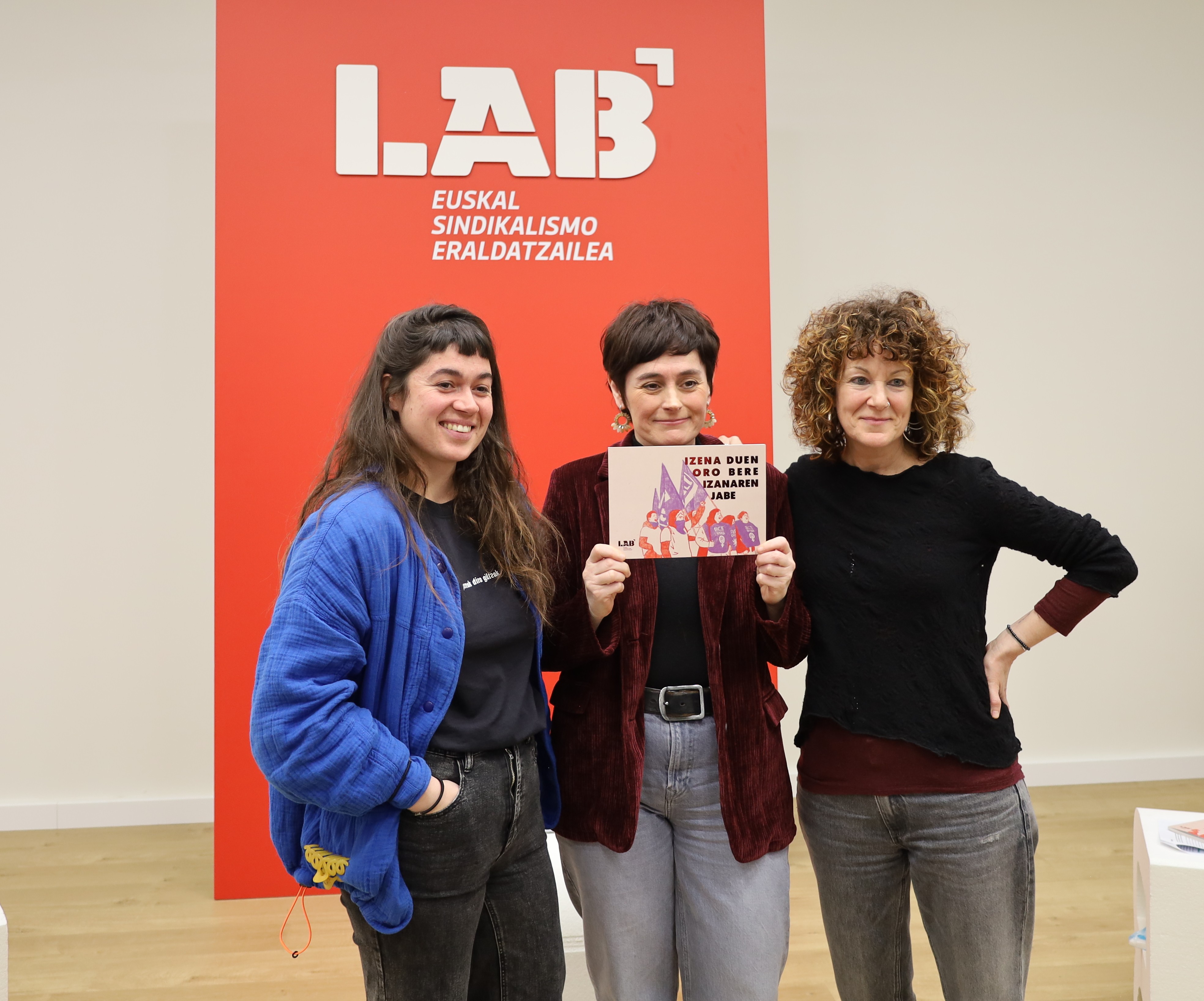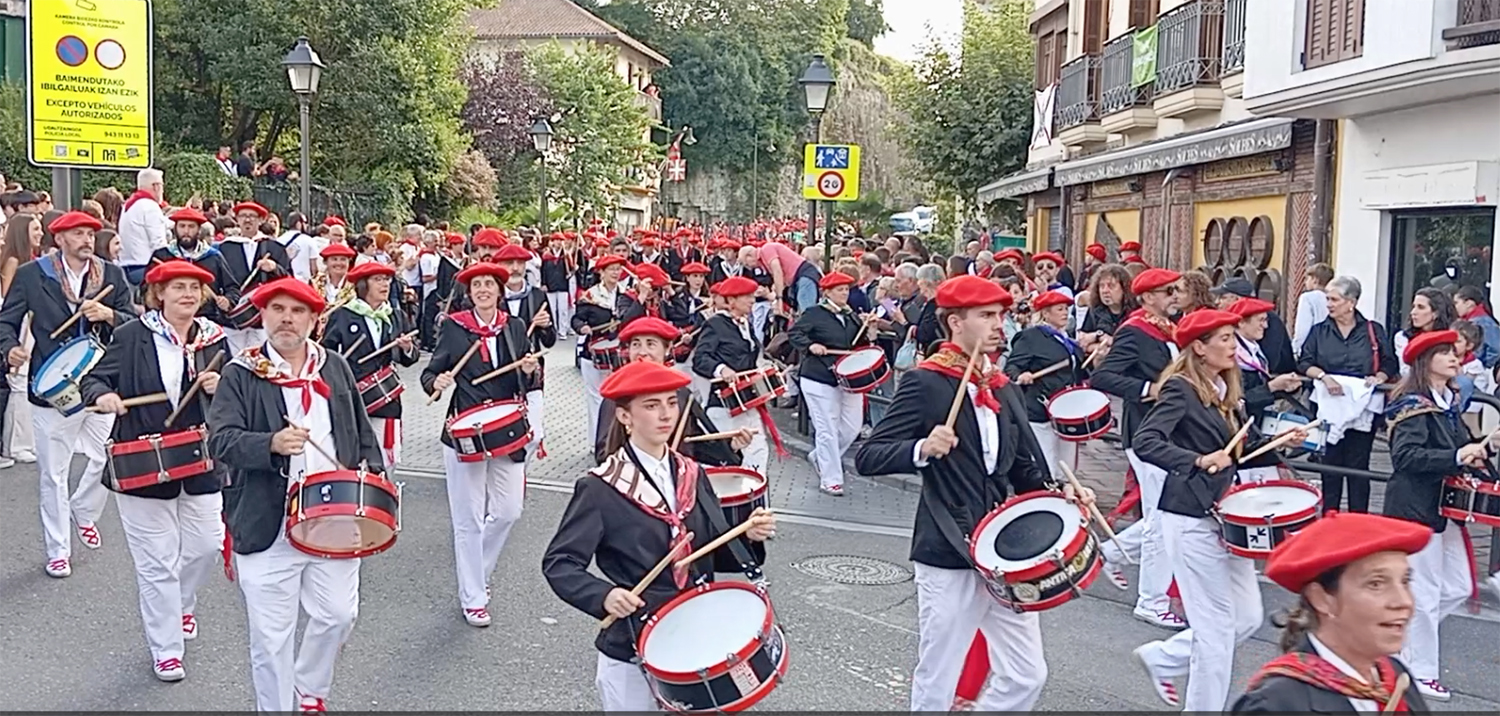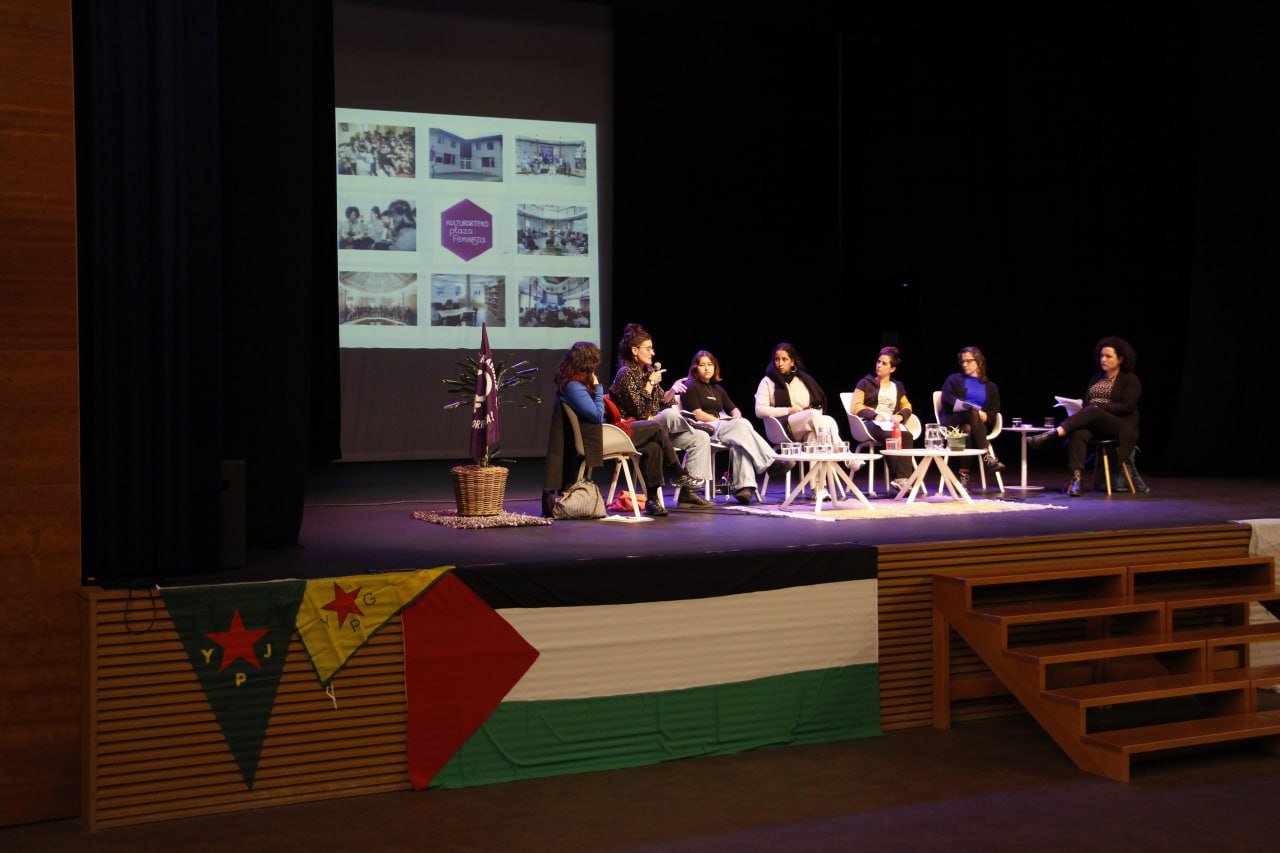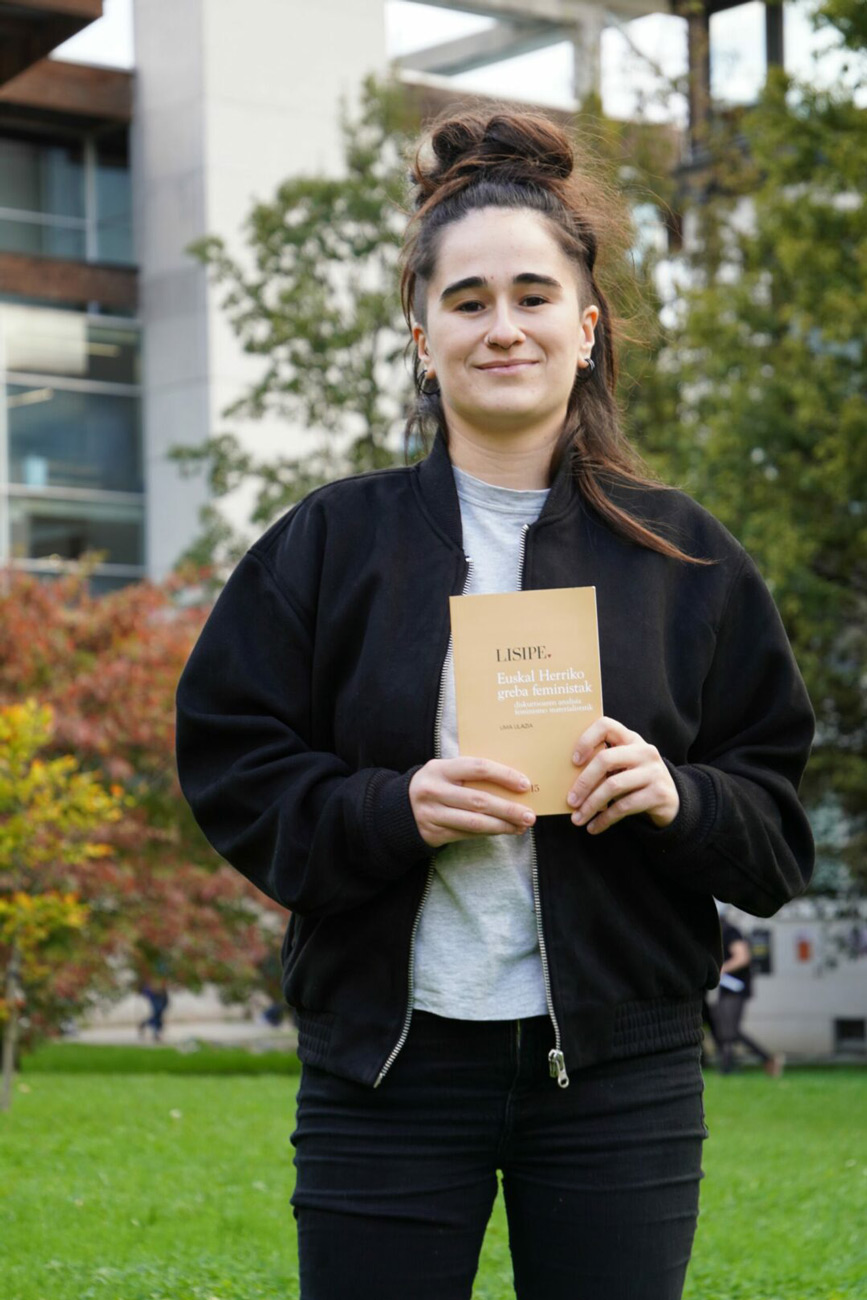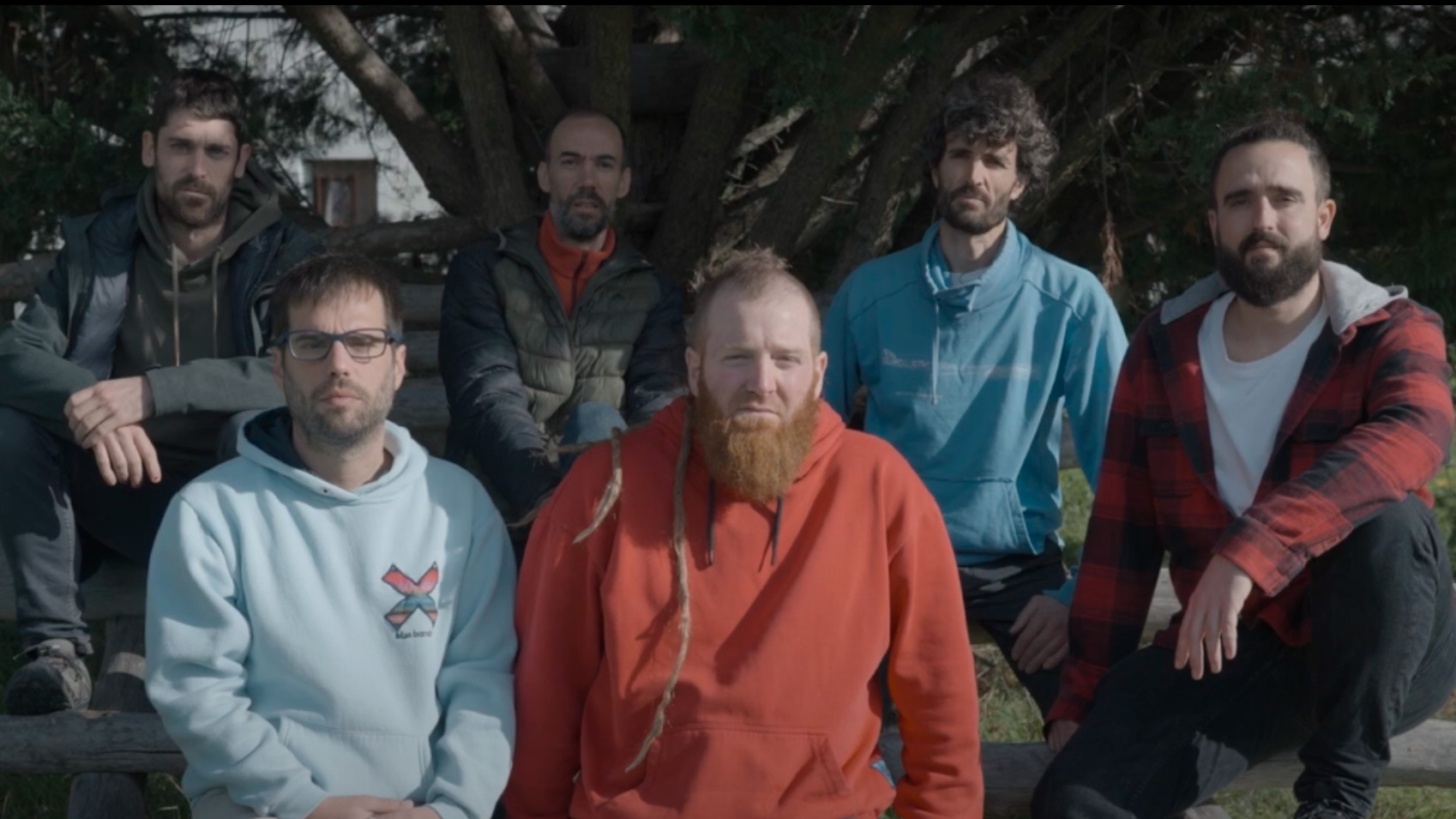"The day we women start to look at our desires, there's no patriarchy."
- Above all, Irantzu Varela knows how to communicate. You've seen it in several videos and lectures, but, finding yourself face-to-face with it, it has taken you with the same force and, above all, it has made you laugh.
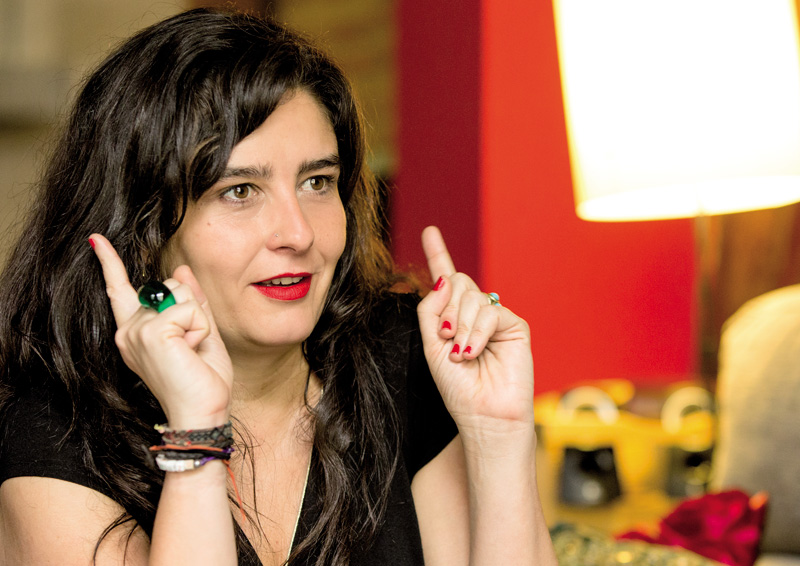
How did you get to feminism?
I remember when I was growing up, I didn't like things like being a child. For example, I saw cowboy movies, and in those movies, the girl was always an incapable creature, had to help her in everything, just screaming in fights ... It was rabid, because I identified with that figure, but I wouldn't. As you grow up, you feel outraged. Then, the university was a kind of awakening.
He studied journalism, didn't he?
Yes. Think of Leioa, studying journalism, in those times... I gained political awareness. I opened my eyes, and I saw a lot of things happening in the world, a lot more things than I had suspected. I also realized I could do something. I really enjoyed it. As if I had suddenly grown up, I understood in college that there was no other choice but to get in trouble.
Have you then worked as a journalist?
I wanted to be a journalist all my life, but I wanted to be a war reporter, like Rosa María Calaf and Carmen Sarmiento, and when I finished my studies, I realized that I was a long way away. So instead of being a scholarship student in a medium that I wasn't interested in, I went into a master's degree of collaboration. I did internships in Venezuela, and I was the head of communication for a human rights organization. I got there right after Chavez won the election: that did get into trouble. It was a dream job. He worked in the association of families of victims of Caracazo. He collected testimonies, among others, from people who made their family disappear, from people who tortured them ... I saw that violence has many faces and that it is very important to make all of them known. I also learned to dance salsa. After a while I came back.
And how did Faktoria Lila come about?
A friend and I started the cooperative 9-10 years ago. Objective: to bring together and work on cooperation, gender equality and communication. We were both journalists, we worked in cooperation, and we were very interested in feminism. We started working with institutions and others. More and more things about equality began to arrive, and we decided that feminism would also appear on our web, a term that people rejected at that time. But we got so many things out there that we thought we would put all the things about feminism in a space, and that that space would be more urban. That's Faktoria Lila. Then, as it has taken a certain size, it is a project on its own, and today I am immersed in that project.
Which lines of work do you work?
We conducted face-to-face and networking workshops. Faktoria Lila’s goal is to return feminism to beginners. All women live the patriarchy in a thousand ways every day, so our goal is to bring the feminist discourse daily. We work mostly romantic love and beauty. I believe that these are the fundamental areas of inequality.
The key to our proposal is to build on the experiences. We don't explain anything, we give tools for everyone to know. In patriarchy it is inevitable that we feel patriarchal, because otherwise, we would spend the day cutting our veins or turning the streets upside down. In order to survive without much pain, you have to become an accomplice to the patriarchy, so the important thing is for everyone to look at the complicities that he has built to survive in the patriarchy. If you find them no longer useful and you are a much freer and happier person.
Why do these two lines of work seem so fundamental to you?
It has to do with everything we've conquered. In the laws there is equality, that is true. In the Spanish State, exclusion is illegal and we have rights. We have achieved formal equality through centuries of feminist struggle, but in society we are still cheap, and at home we are slaves, as we continue with 80% of care work in exchange for money. They had to find a pretext for these women to continue to do those tasks: to learn, to guide, to have a current account and to survive economically. It seemed that, once all these achievements were achieved, we would send the devil to the patriarchy, the imposition of housework and the fact that they were second-class workers, but ...
Has the ideology of romantic love been the tool for continuing to tread?
We've been fooled: we've let them control us, we've got monogamy and heterosexuality imposed on us, we've got to tell us how to love, how to touch the skin, and we've got love and sex to march together all the time.
We have a problem with love, that's clear, because the World Health Organization (WHO) says that half of the women killed in the world are killed by their partner or former partner. Therefore, in the space of love, besides taking care for free and satisfying the needs of everyone else, they kill us. In the name of that ideology, they kill us. The Spanish State’s gender violence law does not take you into account, unless you have a sentimental relationship with the aggressor. The woman recently murdered in Vitoria-Gasteiz, for example, will not be considered a victim of gender violence. For this reason, they do not consider murdered prostitutes as such and cannot refuse to suffer gender-based violence. Patriarchal ideology and capitalism are perfectly suited to the idea of romantic love that exists today. Everyone has to look for how they want to love, how they want to make a stem and, if they want, to bring them together.
You also mentioned beauty. Naomi Wolf explains it
very well. I think all women should read The Beauty Myth, in April or so, and then tell the bikini operation. Wolf says in that book that they want to be docile to us. All women in the world are subjected to structural oppression: Why the hell do we accept it? Because we dedicate energy to other things, because the main mandate of the patriarchy is that we like it, and to please others we have to be very good, caring for the whole world, predicting and satisfying the needs of the whole world, and we also have to be very similar, tall, lean, big boobs, young, no blue hair, no nails, no nails on the head, no hair on the nails. It is terrible and, moreover, impossible. Patriarchy has set us such an objective, let us never achieve it. If we stop loving everybody, we'll start trying to like ourselves, we'll question a lot of things, and that's where patriarchy will end.
How did The Screw break?
Maybe I'll spoil the legend, you know, by the time we take the lot out on the DVD, but ... I was asked to participate in a roundtable on communication and revolution, and there was La Nut, which was not yet Pablo Iglesias. A lot of people came together, it was a very masculine audience, so I took the opportunity and I gave my best. Churches stood on stone and then, on the boat behind the table, he asked me if I would make some short videos. I settled. At first, The Nut was created to make feminist critique. But as soon as I got to the second or third program, I started talking about what I wanted. I often do not follow the overall political agenda, and I do so with intent, because I believe that feminists have our own agenda and that we have to address it.
As a result of the videos, you have received many attacks.
The first season was amazing. Before the second program came out, I was threatened with death. Rebellious people are so predictable, they always insult me in the same way, talking about my physique and my sex life.
My sexuality is, on the one hand, very intense: from penis to cat, from whore... Or, if not, nobody wants to touch me, not even with a stick. Sometimes, all of that is told to me in a sentence. They're very interested in my sex life, they're also making proposals: where do I get my penis, get it into the group ... Then, of course, I'm constantly called a lesbian, as an insult. About my body, seven trillion people tell me I'm fat and ugly, and one or two of the seven trillion people tell me I'm OK.
How do I deal
with it?At first I read them all and said they didn't affect me. It's not true. I am not afraid; after all, fear is an opportunity and I will not allow it. They don't condition me at all, but they affect me, because you know you're doing something for that, that you're not doing it just for you, but because it's enough, and it's unfair that you're assaulted as much as that, and that such attacks are so violent. They don't scare me and they don't condition me, I'm clear, but I get angry.
You often answer with humor.
And how can you answer if they insult you (whore, aunt, cow, feminazi) and when they kill two women they tell you what happens to all those women who lead their men to suicide? Humor is an impressive weapon, a tool that we're discovering in feminism. Using humor, disarm them. The more you laugh, the more they blur. The more sarcastic the videos are, the stronger and stronger the indignation of the rebels. They're serious and you're laughing more and more. I think so far we have underestimated the strength of humor.
In December 2015, you were a candidate for the Spanish Senate in Bizkaia with the EH Bildu coalition. You did the campaign with Onintza Enbeita, a congressional candidate. They made a special campaign, you can't deny it.
To start with, I had a great time, and that's fundamental. We started with the motto “Bizkatik Madrilera Everything Is Curved”. Onintza and I are feminist and fat women. That's tremendously political, not only recognizing ourselves as feminist women, but accepting that we don't get into measure 38, not even 42. It is political to say that we are not good, at least not as the patriarchy commands. Thanks to El Screw I realized that in feminism we are always talking about the body, “our body, our battlefield”, but suddenly the body is not something so abstract; suddenly, Irantzu’s face and body are part of the struggle: there they are, people see them... If the bodies of Onintza and Irantzu were not brought to the table, we would lose the opportunity to make politics. It is, although you hardly understand it if you are a man or join the beauty canon (although very few women feel they agree with the beauty canon).
What did you learn from the campaign?
I learned, among other things, what it was like to be a woman in such a world. They often remind you that you are a woman, much more than you can remember yourself. Maybe men are astonished, but women are in different spaces, without continually thinking that we are women. In these masculinized spaces, which are not only filled with men, but are powerful men, women are a constant presence, evident, as if you were a pottoka.
In the June elections, the candidacy has changed. What do you think about this? Some will
find it too risky a wager that Onintza and I would present myself as candidates, the two public feminists, without hairs in their mouths, but I believe that in some things it will not be left behind. After all, we were no more than the face of all this; we had all the feminist colleagues on our side, supporting us. The militants of the party base and the party itself advanced a step forward, it is to be welcomed, and things such as the explicit mention in the feminism program, the presence of feminist women in the first line campaigns, the inclusion in the agenda of issues that feminism has always addressed...
Kazetaria da, ikasketaz; hala ere, garapenerako lankidetzan jardun du hainbat urtez. Militante feminista ezaguna da. Gaur egun, Faktoria Lila ekimenaren barruan, blog batean idazten du, eta desprintzesatzeko tailerrak ematen. Bideo laburrak egiten ditu La Tuerka interneteko programan. Espainiako senaturako hautagai izan zen 2015eko abenduan, EH Bildu koalizioaren eskutik.
Bere jardunaren ondorioz jasotzen dituen erasoez mintzatu gara elkarrizketan, hala ere, aurrez aurrekoan erantzun oso positiboak jasotzen dituela azpimarratu du Varelak. "Gehien-gehienek eskerrak ematen dizkidate egiten dudan lanagatik. Izugarri hunkigarria da hori".
This wedge that the announcement on the radio Euskadi to replace the bathtub with a shower encourages the commencement of the works in the bathroom of the house. A simple work, a small investiture and a great change are announced. There has been a shift in toilet trends and a... [+]
Zalantza asko izan ditut, meloia ireki ala ez. Ausartuko naiz, zer demontre! Aspaldian buruan dudan gogoeta jarri nahi dut mahai gainean: ez da justua erditu den emakumearen eta beste gurasoaren baimen-iraupena bera izatea. Hobeto esanda, baimen-denbora bera izanda ere, ez... [+]
Goldatz talde feministak antolatua, ortziralean, urtarrilaren 3an, Jantzari dokumentala proiektatuko dute Beralandetan (17:30ean) eta biharamunean, urtarrilaren 4an, Berako bestetako tradizioak aztergai izanen dituzte Maggie Bullen antropologoarekin leku berean (10:30).
Ander Magallon, Mikel Irure eta Xabier Jauregi Metropoli Forala saioan egon dira maskulinitate berrien inguruan mintzatzen.











